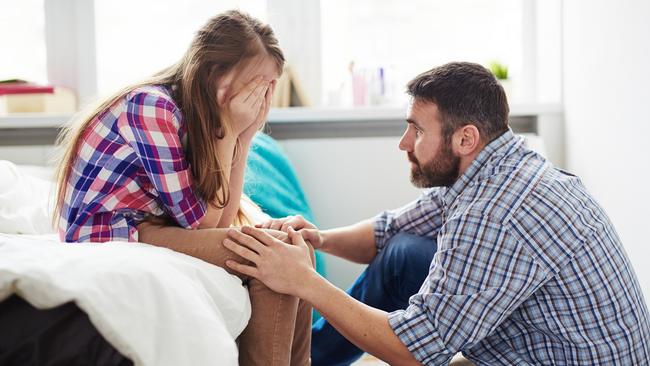Most mentally ill children untreated, shock study finds
A concerning new study shows the majority of children suffering mental illness are not receiving treatment. Here are the tell-tale signs your child may be one of them.
QLD News
Don't miss out on the headlines from QLD News. Followed categories will be added to My News.
THE majority of children suffering with mental health disorders do not get any professional help, a concerning new study has revealed.
Girls, young children and families from non-English-speaking backgrounds were found to be the least likely to access services.
Year 7s should be psych-tested
The research, led by Murdoch Children’s Research Institute, will be published today in the Australian Journal of Psychology.
It analysed the mental health of nearly 5000 children from the ongoing Longitudinal Study of Australian Children.

For the study, parents reported on their children’s emotional problems in a “strength and difficulties” questionnaire – the results were then linked with Medicare Benefits Schedule data to see which families had accessed help.
Lead author Professor Harriet Hiscock said less than one in four children with mental health problems saw a health professional in the 18 months after they were identified as having a problem.
“What I really find concerning is that so few of these young children — 8-13 years of age they were — who are experiencing clinical levels of mental health problems are just missing out on any help,” she told The Courier-Mail.
“That is a great concern.”
Prof Hiscock said families may delay getting help for young children in the hope they will “grow out” of their mental disorder, but as the situation worsens they seek treatment.
“They don’t tend to realise that if they can go and get help earlier than that’s going to lead to a better outcome for their child,” she said.
“We know if a child has a mental health problem or disorder left untreated around 50 per cent of those kids will go on to get a mental health disorder in adolescence or adulthood.”
The research found girls were less likely to receive care than boys — 30 per cent of children who received support for emotional problems at ages 8/9 and 10/11 were female despite 50 per cent of those needing help being girls.

Researchers also found 14 per cent of children with emotional problems came from a non-English-speaking family, but only two per cent received help.
Younger children were less likely to access services than older children.
“I think we need to have greater parent awareness and education that children can suffer from mental health difficulties and that they do response to help and treatment,” Prof Hiscock said.
“But we also need to make sure that the treatment is accessible and affordable.”
WHAT PARENTS SHOULD LOOK OUT FOR IN THEIR CHILDREN:
* Lack of enjoyment in things that they previously have found fun
* Repeated patterns of not wanting to go to school
* Change in appetite and sleep patterns (not eating or sleeping as much OR eating too much and sleeping too much)
* Voicing particular fears or anxiety about things
* Children who can’t focus, can’t sit still, very impulsive


